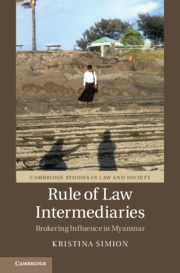Book contents
- Rule of Law Intermediaries
- Cambridge Studies in Law and Society
- Rule of Law Intermediaries
- Copyright page
- Dedication
- Contents
- Tables
- Preface
- Acknowledgements
- Abbreviations
- Chapter One Introduction
- Chapter Two Between Universals and Particulars: Rule of Law as a Travelling Model
- Chapter Three Intermediaries: Who, What, When?
- Chapter Four Rule of Law Assistance: Actors and Technologies
- Chapter Five The Emergence of Intermediaries
- Chapter Six Intermediaries: Background, Capital, Motivations
- Chapter Seven Intermediaries as Trust Builders
- Chapter Eight Intermediaries as Translators
- Chapter Nine Intermediaries’ Influence, Foreign Actors’ Dependence
- Appendix Overview of Research Participants
- References
- Index
- Cambridge Studies in Law and Society
Chapter Two - Between Universals and Particulars: Rule of Law as a Travelling Model
Published online by Cambridge University Press: 17 April 2021
- Rule of Law Intermediaries
- Cambridge Studies in Law and Society
- Rule of Law Intermediaries
- Copyright page
- Dedication
- Contents
- Tables
- Preface
- Acknowledgements
- Abbreviations
- Chapter One Introduction
- Chapter Two Between Universals and Particulars: Rule of Law as a Travelling Model
- Chapter Three Intermediaries: Who, What, When?
- Chapter Four Rule of Law Assistance: Actors and Technologies
- Chapter Five The Emergence of Intermediaries
- Chapter Six Intermediaries: Background, Capital, Motivations
- Chapter Seven Intermediaries as Trust Builders
- Chapter Eight Intermediaries as Translators
- Chapter Nine Intermediaries’ Influence, Foreign Actors’ Dependence
- Appendix Overview of Research Participants
- References
- Index
- Cambridge Studies in Law and Society
Summary
This chapter presents a macro perspective of the field of rule of law promotion, drawing on a ‘travelling models’ framework to illustrate the authoritative features that rule of law takes on as a model for development intervention and emphasise rule of law’s mediated necessities rather than its universalities. The framework does not claim that models are coherent and static; rather, that they are fluid, but always present a contrast to domestic worldviews and understandings, and thus are an intervention of some sort. Even when adapted and adjusted by skilled development workers, models need mediation and translation because they will never be fully promoted from the bottom up. The result of bringing in models in illiberal settings that are accompanied by decades of miscomprehensions and that have preconceived meanings in the specific locale is an adapted version of the substantive rule of law ideal that development assistance seeks to introduce. The chapter sets the scene for later understanding the ambiguous work and influence of rule of law intermediaries as they broker different worldviews and understandings between development counterparts in an authoritarian setting.
Keywords
- Type
- Chapter
- Information
- Rule of Law IntermediariesBrokering Influence in Myanmar, pp. 30 - 53Publisher: Cambridge University PressPrint publication year: 2021

